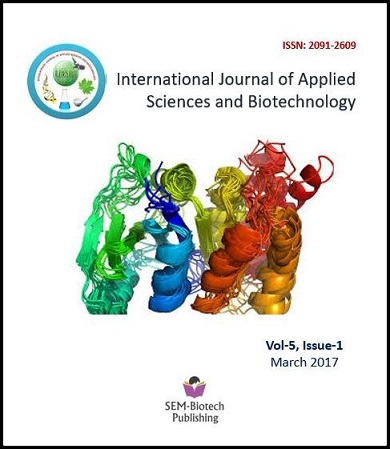Amplification Refractory Mutation System – Polymerase Chain Reaction for Rapid Detection of rpoB Gene Mutations in Mycobacterium tuberculosis
DOI:
https://doi.org/10.3126/ijasbt.v5i1.17020Keywords:
ARMS-PCR, Multiple drug resistance, Mycobacterium tuberculosis, Rifampin, rpoBAbstract
Multidrug-resistant tuberculosis (MDR-TB) has become a serious worldwide threat including in Nepal. MDR-TB refers to the pathological condition whereby Mycobacterium tuberculosis becomes resistant to the first line of drug treatment i.e. rifampin and isoniazid. Resistance to rifampin (RIF) is mainly caused by the mutations in the rpoB gene which codes for the β-subunit of RNA polymerase. In this study, Amplification Refractory Mutation System – Polymerase Chain Reaction (ARMS – PCR) technique has been used to detect mutations in the rpoB gene of Mycobacterium tuberculosis. Total DNA samples of 34 phenotypic MDR-TB were subjected to ARMS – PCR using three different codon specific primers (516, 526 and 531). These three codons occupy large portion of total mutation responsible for rifampin resistance. Out of the total DNA samples, all were bearing mutation in at least one of the three codons mentioned. Of those bearing mutation, the highest number had mutation in codon 531 (97.05 %) followed by codon 516 (17.64 %) and finally in codon 526 (11.76%) respectively. Hence, ARMS – PCR may be used as an alternative diagnostic technique for detection of rifampin resistance in Mycobacterium tuberculosis strains, especially for a developing country like Nepal.
Int. J. Appl. Sci. Biotechnol. Vol 5(1): 81-85




